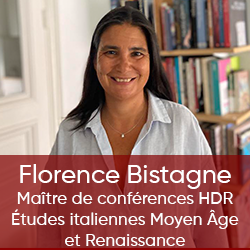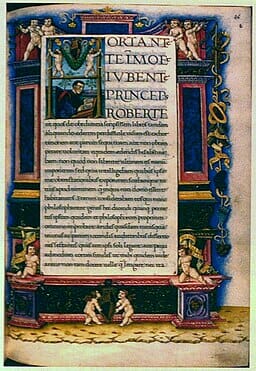[Portrait] Florence Bistagne, Senior Lecturer in Italian Studies of the Middle Ages and Renaissance
What is your research about?
My field of research lies at the crossroads of several spaces, periods, languages and disciplines: the Kingdom of Naples (1442-1503), between the Middle Ages and the RenaissanceThe Romanesque period, which covers what are now southern Italy, Spain, southern France and the Mediterranean islands, was a period in which at least four languages were spoken and written in addition to Latin and Greek. As a specialist in written cultures and a historian of Romance languages, I am what is known as a philologist: I research, edit, transcribe and translate historical and literary sources from this period, making them available both in book form and in digital format.
I work in Latin, Greek, Italian, Neapolitan and Catalan.

What are your current scientific activities?
I am the winner of a ANR collaborative research project, LUXART, on luxury and the arts in the Kingdom of Naples during this period. In collaboration with Joana Barreto, an art historian from Lyon II, and fellow Italian and Spanish academics and museum curators, we are attempting to reconstruct the heritage of the kings of Naples that was dispersed to many countries (Italy, Spain, France, Austria, Belgium, the Netherlands and even the United States) following the Italian wars from 1494 onwards, Spain, France, Austria, Belgium, the Netherlands and even the United States) through a virtual exhibition and digital editions with texts that will help us to better understand luxury, the use of money and the status of the artist in early modern Europe.
In 2022, I co-edited the book Minorities, migration and globalisation in the Mediterranean 14th-16th century, which came out of the last face-to-face conference held in Avignon in February 2020 and which corresponds to the "historical" axis of the ICTT laboratory. Finally, in 2023, I edited a booklet for the Mélanges de l'École française de Rome - Middle AgesI am also working on another ICTT programme, plurilingualism in ancient times, and I have submitted a book of unpublished sources (correspondence and dialogues) by Giovanni Pontano to Classiques Garnier for publication.
Why did you choose to work in academic research?
Through my initial training at the École normale supérieure, in both the classics (Latin, Greek and French) and Italian, I was made aware at an early age of the mass of what we don't yet know, of scripts that we no longer know how to read, and I wanted to contribute to the production of knowledge. I worked in various communications jobs, in the private sector and in public institutions, before settling on a university that combines research with the dissemination and transmission of knowledge through teaching.
What advice would you give to students who want to do research?
First and foremost choose a long-term research topic that appeals to them First of all, at Masters level, you spend time on research and you have to enjoy it. Secondly, given the current situation, it's important to think about a fallback solution in which you are competent and which is not by default. There are many professions that need a solid grounding in the human sciences, and these should not be neglected.
What object or image from your business best illustrates you?
This page of the manuscript of political treaties In principle (The Prince) and De obedientia (On obedience) exactly symbolises my research: illuminated and copied in Naples in the 2ᵉ half of the 15ᵉ century, it is kept at the university library in Valencia, Spain. Written by Giovanni Pontano, prime minister of the kingdom but also a leading intellectual, it is dedicated to the wealthy prince Roberto Sanseverino, but it is the author at work who is the subject of the illumination, thus showing the pre-eminence of the intellectual over the man of war. It is a luxurious object whose contents provide the keys to the prince's correct attitude towards his subjects. Written in Latin, it was read by Machiavelli for the Prince ! It symbolises the circulation of goods and knowledge in a common space dominated by Naples and its culture.

The ICTT laboratory (Cultural Identity, Texts and Theatricality)
ICTT (Identité Culturelle Textes et Théâtralité) is an interdisciplinary team currently comprising 35 permanent members and 20 doctoral students from CNU sections 7, 9, 10, 11, 12 and 14. The team examines issues relating to identity and its representations, particularly in minority environments and in societies in transition or modified by migratory flows and the phenomenon of globalisation.
The portraits
You can discover all the portraits by visiting on this page.
Updated le 30 October 2023